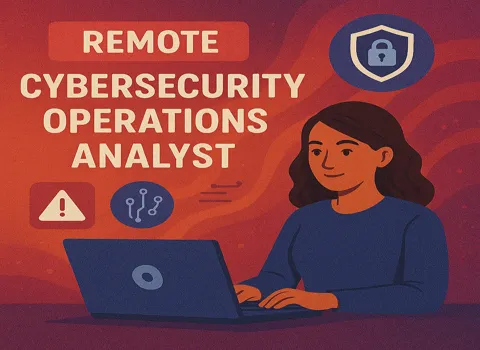Remote Cybersecurity Operations Analyst
Description
🛡️ Remote Cybersecurity Operations Analyst – $101,400/year
🚀 Role Overview
📍 Introduction
Are you a cybersecurity expert seeking an opportunity where your skills have a direct impact? As a Remote Cybersecurity Operations Analyst, you will be instrumental in protecting complex digital infrastructures and ensuring the resilience of high-value systems. This position is well-suited for professionals who are detail-oriented, forward-driven, and enthusiastic about navigating the challenges of today’s ever-changing cybersecurity landscape. In a world where cyber threats evolve rapidly, we seek dedicated individuals who can respond with innovation, agility, and strong technical acumen. If you're eager to apply your current skill set while continuously advancing your career, this is the platform to do it.
✨ Purpose of the Role
This position involves proactive monitoring of digital systems to detect and neutralize potential cyber threats before they cause harm. You'll lead investigations into suspicious activities, coordinate rapid responses to security incidents, and collaborate with internal and external teams to reinforce defense systems. By enhancing cyber resilience, you’ll contribute directly to business continuity and organizational trust. This is not just about reacting to threats; it’s about staying ahead of them, setting strategies, and building a culture of security excellence.
🧠 Key Responsibilities
🛠️ Core Duties
- 🔐 Monitor enterprise-grade security systems, including SIEM, IDS/IPS, and EDR platforms
- 🌐 Conduct deep analysis of emerging threats, including zero-day vulnerabilities, phishing attacks, ransomware, and insider threats
- 🗞️ Prepare detailed technical and executive-level incident reports outlining root causes and remediation
- 🛡️ Coordinate multi-team responses to cybersecurity incidents to ensure swift and complete containment
- 🛠️ Perform comprehensive vulnerability scans and implement prioritized risk mitigation plans
- 🔍 Investigate suspicious activities flagged by automated tools and correlate logs across networks, endpoints, and cloud
📊 Strategic Involvement
- 🧩 Develop and continuously improve security operation center (SOC) runbooks
- 🎯 Implement and maintain alignment with global compliance and regulatory frameworks such as GDPR, NIST, and ISO 27001
- ⚠️ Simulate and evaluate red/blue team exercises to enhance detection and response effectiveness
- 📚 Curate and disseminate threat intelligence updates to stakeholders
- 🧱 Support the design and execution of cyber drills and resilience tests
💡 Skills and Qualifications
📘 Educational Background
- 🎓 Bachelor’s degree in Cybersecurity, Computer Science, IT, or a related field
- 📜 Preferred certifications: CISSP, CEH, GIAC, OSCP, or CompTIA Security+
💼 Professional Experience
- 🧠 Minimum of 3 years in an active threat monitoring, SOC, or cybersecurity analyst role
- 🧪 Proven expertise in operating and fine-tuning security monitoring tools, intrusion prevention systems, and endpoint defense platforms
- ⚙️ Strong scripting skills in Python, Bash, or PowerShell for automating threat detection and reporting
- 🌩️ Familiarity with cloud security practices across AWS, Azure, or Google Cloud
🌱 Personal Attributes for Success
🔬 Core Traits
- 🔯 High attention to detail with exceptional analytical and problem-solving capabilities
- 🔄 Adaptable and calm under pressure, particularly during high-severity incidents
- 🧬 Excellent interpersonal and documentation skills, with the ability to communicate complex findings to varied audiences
- 🤝 Team-oriented with mentoring ability and a cross-functional collaboration mindset
- 🎯 Driven by a sense of mission to protect digital ecosystems and users globally
🌿 Growth Opportunities
📈 Professional Development
- 📁 Gain access to company-sponsored learning platforms for certification prep and continuous education
- 🗺️ Lead initiatives on advanced threat detection and automation using AI and ML technologies
- 🚀 Transition into higher-level roles like Threat Intelligence Lead, SOC Manager, or Security Architect
- 🔎 Gain exposure to innovative tools such as blockchain-based identity protection and quantum-safe encryption
- 💼 Contribute to the future of cybersecurity by helping shape internal policies and risk management strategies
🛠️ Technical Environment
🔢 Tools and Platforms
- 📉 Centralized security monitoring technologies: tools like Splunk, IBM QRadar, and other log analytics platforms
- 🤎 Endpoint Detection & Response (EDR): CrowdStrike, Carbon Black, SentinelOne
- 🌐 Network Protection: Palo Alto firewalls, Cisco ASA, Snort, Suricata
- 🧰 Automation & Scripting: Python, Bash, PowerShell for playbook execution and log correlation
- 📊 Analysis & Visualization: Elastic Stack, Kibana, Wireshark, Maltego
🌍 Work Culture & Environment
🏡 Remote-Friendly Setup
- 🏠 Work from home with flexible shifts, ensuring work-life balance
- 🧘♂️ Regular wellness sessions, mental health days, and ergonomic support
- 🌟 Culture of equity and belonging, where every team member's perspective is appreciated and respected
- 🤝 Team retreats and virtual meetups for team-building and innovation workshops
- 📢 Transparent communication and open-door policies with leadership
🔍 Impact of the Role
📈 Organizational Contributions
- 🔒 Shield highly sensitive data across healthcare, fintech, education, and enterprise services
- 🌐 Ensure the availability and reliability of global digital platforms used by millions
- 🧠 Provide critical intelligence to preempt major cyberattacks and reduce downtime
- 📊 Reduce overall risk exposure through rigorous monitoring, triaging, and remediation
- 🧬 Help define industry benchmarks by contributing to open-source threat databases and collaborations
🤜 Collaborative Partnerships
💬 Internal & External Teams
- 📢 Collaborate with Security Engineers, DevOps, and IT Operations teams to integrate cybersecurity into all layers of technology infrastructure
- 🛠️ Engage with third-party vendors and MSSPs to ensure seamless threat intelligence exchange
- 📊 Align closely with Legal, Risk, and Compliance teams to navigate the regulatory environment
- 📚 Partner with audit teams during assessments and regulatory inspections
- 🔄 Act as a bridge between technical execution and business continuity planning
✅ Required Competencies
📊 Core Knowledge
- 🛢️ Solid grasp of the MITRE ATT&CK and Cyber Kill Chain frameworks
- 🔄 Practical experience with DevSecOps, CI/CD pipeline security, and Infrastructure-as-Code
- ⚙️ Hands-on experience in packet analysis, malware sandboxing, and reverse engineering tools
- 🔠 Ability to document findings thoroughly while maintaining confidentiality and accuracy
- 📈 Capacity to contribute to internal metrics that track detection, response, and recovery times
🎓 Career Vision
🚀 Long-Term Outlook
In this position, you will grow into more than a cybersecurity analyst—you will become a security strategist, a technical leader, and a trusted guardian of information assets. With an evolving threat landscape, your value will continuously rise. Whether you aim to advance within incident response, architecture, or risk governance, this role will provide the stepping stones needed to move into future leadership positions.
✨ Take the Next Step
🖐️ Call to Action
Are you ready to defend digital infrastructure, influence high-impact security decisions, and elevate your cybersecurity career? Take the next step in your cybersecurity journey today! Published on: Apr 17, 2025



